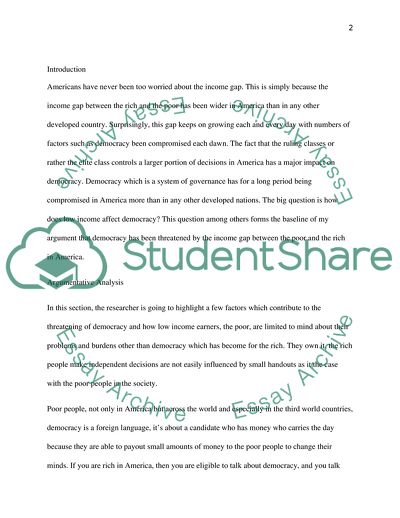Cite this document
(The Wealth and Income Gap between Rich and Poor Threatens Democracy in Coursework Example | Topics and Well Written Essays - 1750 words, n.d.)
The Wealth and Income Gap between Rich and Poor Threatens Democracy in Coursework Example | Topics and Well Written Essays - 1750 words. https://studentshare.org/macro-microeconomics/1863238-the-wealth-and-income-gap-between-rich-and-poor-threatens-democracy-in-the-us
The Wealth and Income Gap between Rich and Poor Threatens Democracy in Coursework Example | Topics and Well Written Essays - 1750 words. https://studentshare.org/macro-microeconomics/1863238-the-wealth-and-income-gap-between-rich-and-poor-threatens-democracy-in-the-us
(The Wealth and Income Gap Between Rich and Poor Threatens Democracy in Coursework Example | Topics and Well Written Essays - 1750 Words)
The Wealth and Income Gap Between Rich and Poor Threatens Democracy in Coursework Example | Topics and Well Written Essays - 1750 Words. https://studentshare.org/macro-microeconomics/1863238-the-wealth-and-income-gap-between-rich-and-poor-threatens-democracy-in-the-us.
The Wealth and Income Gap Between Rich and Poor Threatens Democracy in Coursework Example | Topics and Well Written Essays - 1750 Words. https://studentshare.org/macro-microeconomics/1863238-the-wealth-and-income-gap-between-rich-and-poor-threatens-democracy-in-the-us.
“The Wealth and Income Gap Between Rich and Poor Threatens Democracy in Coursework Example | Topics and Well Written Essays - 1750 Words”. https://studentshare.org/macro-microeconomics/1863238-the-wealth-and-income-gap-between-rich-and-poor-threatens-democracy-in-the-us.


